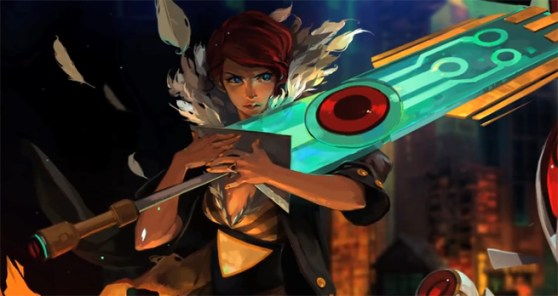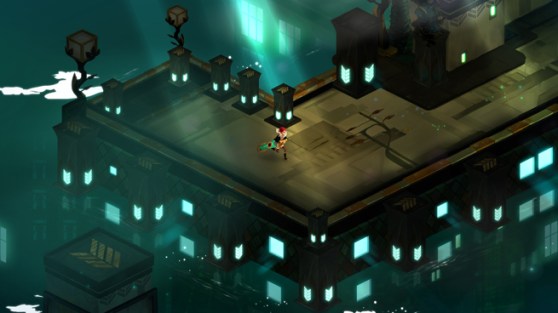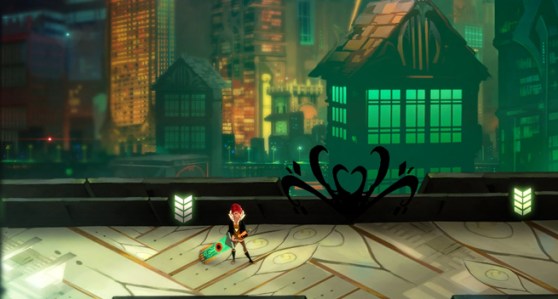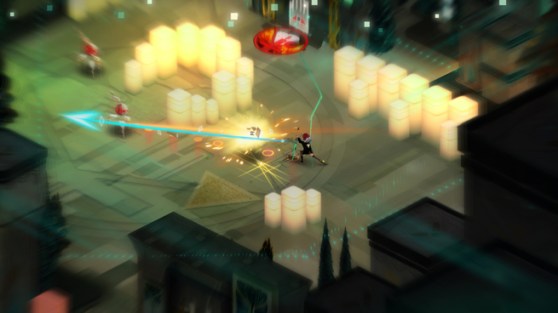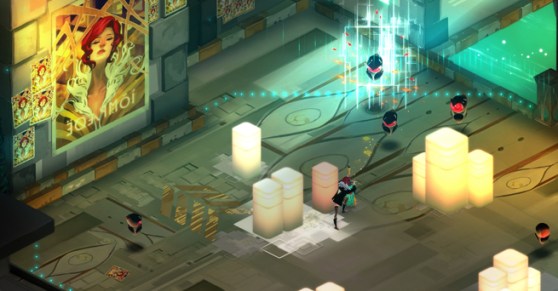Red was a star. Now she’s a target. Five assassins came at her and missed with the ultimate weapon, the Transistor. The one and only. It’s hers, now. All she has to do is pull it from the body of her dead friend like Excalibur from the stone.
“Hey, Red,” says the sword in her dead friend’s voice, “That’s not me. Not anymore. I’m safe now in here. Safer than you. So please … let’s go.”
Transistor is Supergiant Games’ follow-up to their hit 2011 debut, Bastion, and the early impression is they’ve skipped the sophomore slump. The entire Bastion team is back on board, right down to vocal talent Logan Cunningham (Bastion’s narrator), artist Jen Zee, composer Darren Korb, and writer Greg Kasavin, now Supergiant’s creative director. He’s got to hold details back, but Kasavin really, really wants to talk Transistor. His enthusiasm is palpably high.
“The relationship between these two characters is important to the story,” says Kasavin, even though he can’t divulge the real name of Red’s friend. “It’s not spoilery,” he adds. But unlike the central hub in Bastion, Transistor is very much a road movie, with Red and her talking sword on a dangerous journey in search of answers … and revenge.
You see, Red’s a famous lounge singer. The price for survival was her voice.
She might not care much at the moment, but bigger-picture issues exist, too. Transistor takes place in the city of Cloudbank, a misty, almost jazz-era smash of wooden A-frame houses and ultramodern skyscrapers. A hundred of its most influential citizens have vanished in the last year, taken by machines called The Process. The Process has a plan. Red was supposed to be its latest victim. Now it wants her more than ever, and it wants the Transistor back.
All that sets up an interesting dynamic. Red can’t say a word. All her feelings, emotions, and motives come through what the dead man in the Transistor says to her.
Kasavin describes that as “part of the fun of having a silent protagonist. It’s not just a video game trope. It’s part of the story. She’s a reflection of how this world is different and the kind of values that exist there.”
“You may have some amount of sympathy with her desire for revenge, but nothing was done to you personally. We want to set up a situation where you have a good sense of what her motivations are, but as the story unfolds, you get to reflect. Your goals become more aligned.”
Red’s immediate goal: survive. Process robots — tiny Creeps and big, ground-pounding Jerks — find her easy enough. Destroyed Creeps drop cells that figure into the upgrade system, but Red has to collect them before they rebuild themselves back into functioning Creeps.
Lucky thing the Transistor’s not just for show. Red starts with a slow, overhead swing, but they find half-processed souls from other Process victims, and those disembodied spirits want to tag along. Integrating them into the Transistor adds new attacks; a powerful beam weapon, a cluster bomb, a high-speed dash.
They all come together with Turn, a time-freezing move that you can use to stack up attacks — and then unleash them all in one blindingly fast moment. A meter tracks how much you can do during Turn, including just moving around. It plays into Transistor’s puzzles, but mainly Turn is for whomping on robots. It didn’t take long before I’d activate Turn, pour two big swings into a Jerk, dash out of range, spin, and tag him with an energy beam before hitting the “go” button to watch all the damage pile on at once. It makes the combat feel deliberate, tactical, and entirely satisfying.
I’m not the only one who feels that satisfaction, either. Red has a clear opportunity to get the hell out of Dodge. To escape. She steers her motorcycle right for The Process instead. The Transistor pleads with her to reconsider. “You’ve met these things,” it says, “They do not have a sense of humor. You’re more than just a name to them now. They will track you down, wipe you out, and take the Transistor.”
Red can’t answer. You get the sense she’s not even listening. “Revenge is a very powerful motivator,” says Kasavin.
He can’t say more. But he can talk about his motivations for Transistor and what he wants to accomplish with it. “People invest a lot of time to play through a game,” he says. “They should feel like their time was time well spent. The narrative isn’t solely responsible for that, but it bears some of the burden. You don’t feel like we’re stringing you along, like you have no idea where you’re going. And then hopefully it goes to a place that is unexpected and yet feels rewarding.”
Which brings us back to Bastion’s themes of revenge … and forgiveness. Supergiant’s first game proved a master manipulator, guiding players to align and separate from its characters based on their own feelings and opinions. So what will Transistor add to that conversation?
“I don’t want to say anything with Transistor in the same way I didn’t want to say anything with Bastion,” Kasavin insists. “These stories are not meant to have a message. They’re meant to leave you to reflect on something, even in the context of these kinda fantastical, weird worlds. I think that’s what just about any good story should aspire to.”
And it’s hard to bite back on aspiration. Kasavin’s got so much behind the curtain right now. Ideas he’s excited about. Stories he wants to tell. He’s been on the other side of the table, too, working as a game journalist interviewing developers and hoping to hear, see, and do something incredibly cool.
“Man,” he says, “I would love to talk about this.”
VentureBeat's mission is to be a digital town square for technical decision-makers to gain knowledge about transformative enterprise technology and transact. Learn More
